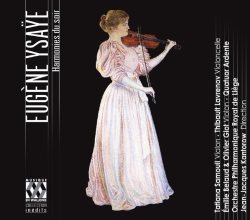|

|
Eugène YSAŸE (1858 – 1931)
Méditation Op.16 (1890s, completed 1919) [12:30]a
Harmonies du soir Op.31 (1924) [13:52]b
Poème élégiaque Op.12 (1893/6, rev. orch. 1902/3) [14:57]c
Sérénade Op.22 (no. date) [7:19]a
Amitié Op.26 (1920s) [16:43]d
Exil Op.25 (1917) [8:06]
Tatiana Samouil (violin)c; Thibault Lavrenov (cello)a; Emilie Belaud and Olivier Giot (violins)d; Quatuor Ardenteb
Orchestre Philharmonique Royal de Liège/Jean-Jacques Kantorow
rec. Salle Philharmonique, Liège, Belgium, September 2012 and November 2013
MUSIQUE EN WALLONIE MEW 1472 [74:01]
Eugène Ysaÿe was one of the greatest violinists of his time and is probably best remembered as such. Many composers actually wrote sonatas for him. Suffice to mention Lekeu, Franck, Jongen (his Sonata No.1 Op.27), Ropartz (his Sonata No.1), Samazeuilh, Magnard, Vierne and Lazzari. One realises immediately that all these composers belonged in one way or another to la bande à Franck. All these sonatas have been recorded by Musique en Wallonie and are available in a boxed set of four discs (MEW 0528-0531). One might also add other works for violin such as Chausson's Poème that was also written for Ysaÿe. Besides the celebrated set of Six Sonatas for solo violin Op.27 (1923) and the short Rêve d'enfant Op.14 (violin and piano, c. 1902) very little of his compositional output is known. He actually composed until the end of his life when he was then busy on a second opera. The first opera Piére li houyeû (“Peter the Miner”) was first performed during Ysaÿe's lifetime and again much later at the Opéra de Wallonie in Liège, although in a concert version now preserved on Musique en Wallonie MEW 0844-0845. So the release under review is doubly worthwhile because it shows the variety of his output for stringed instruments and orchestra as well as the comparative adventurousness of his stylistic evolution. Although he felt no real affinity for some more 'modern' composers such as Bartók or Milhaud he was nevertheless open to more advanced techniques akin to Impressionism or even beyond, leaving Franck's legacy some way behind.
The chronology of his music is rather arduous to trace since some pieces such as Méditation pour violoncelle et orchestre Op.16 were sketched as early as the late 1890s, laid aside for a while and eventually completed in 1919. Similarly Poème élégiaque pour violon et orchestre Op.12 was composed in 1893-1896 for violin and piano but did not reach its final form until 1902-1903 when it was revised and orchestrated. Both pieces are still stylistically indebted, let alone influenced by Franck. This may be more particularly felt in the expansive Poème élégiaque dedicated to Gabriel Fauré. As to chronology again, it is not known when the shorter Sérénade Op.22 (cello and orchestra) was composed but this simpler piece might have been written for his son Antoine, which might indicate a date of composition some time before the outbreak of World War I in which the two sons of Ysaÿe, Théo and Antoine, took part. There is a nice picture of the composer and his sons (both in military uniform) taken by Queen Elisabeth of Belgium in the richly illustrated notes.
The First World War brought an important change in Ysaÿe's life in that he left Belgium and moved first to London and some time later to the States where he was highly regarded as a violin virtuoso. At about that time too his health began to deteriorate because of diabetes and he abandoned his violin playing for a time while turning to orchestra conducting. He conducted the Cincinnati Symphony Orchestra with which he conducted one of the first performances of his Exil Op.25. This work for string orchestra is not only remarkable for the new sound-world that Ysaÿe establishes but also for its rather unusual scoring for violins and violas and no cellos or basses. The music is deeply elegiac, oppressive and sombre throughout with very little relief. However, it has become one of Ysaÿe's best known works, were it only because it was recorded decades ago during the LP era.
Amitié Op.26 for two violins and orchestra is dedicated to his long-time friend Théodore Lindenlaub, editor of Le Temps. They met in 1876-1879 and became firm lifetime friends. Incidentally there is a charming and amusing example of the correspondence they exchanged over the years in the insert notes. This clearly shows that they obviously enjoyed each others company. The music may be somewhat lighter in mood but it clearly eschews sentimentality.
Harmonies du soir Op.31 which gives this release its title is a remarkable work for string quartet and string orchestra and is a real masterpiece in Ysaÿe's output. Stylistically the music, in much the same way as in Exil, explores new harmonic territory, almost at the verge of tonality. This wonderful piece is somewhat better known than most of the others because – again – it was recorded during the LP era. By the way, these LP recordings of Exil and of Harmonies du soir have become collector's items.
Everyone here plays with impeccable technique and deep commitment, and obviously believes in this music which is far too good to be ignored. It is nice to have these works in such convincing readings and superbly recorded. As already hinted the notes accompanying this CD-book are both extremely detailed, informative and illustrated, which makes this release most welcome. It sheds badly needed light on Ysaÿe's compositional output.
Hubert Culot
 |
 |
|











